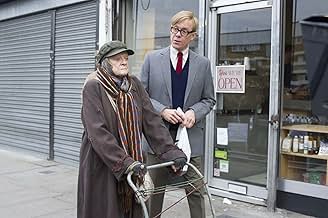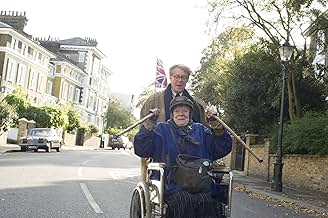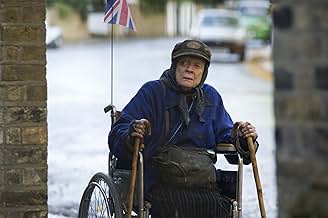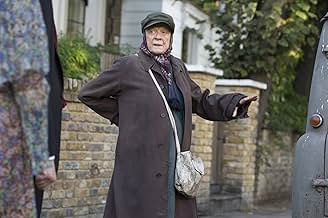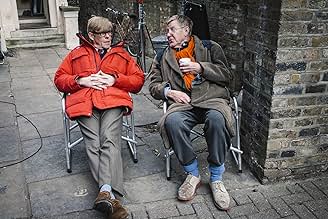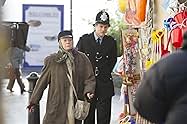IMDb-BEWERTUNG
6,7/10
33.528
IHRE BEWERTUNG
Ein Mann beginnt eine unerwartete Beziehung mit einer Frau, die in einem Van lebt, den sie in seiner Auffahrt parkt.Ein Mann beginnt eine unerwartete Beziehung mit einer Frau, die in einem Van lebt, den sie in seiner Auffahrt parkt.Ein Mann beginnt eine unerwartete Beziehung mit einer Frau, die in einem Van lebt, den sie in seiner Auffahrt parkt.
- Nominiert für 1 BAFTA Award
- 1 Gewinn & 8 Nominierungen insgesamt
Empfohlene Bewertungen
"Lady in the Van" from 2015 is the "mostly" true story of playwright Alan Bennett's relationship with a woman who lived in various vans parked in his driveway for fifteen years. Bennett here is played by Alex Jennings, and the lady, Miss Shepherd, Maggie Smith.
Miss Shepherd, who smells awful from not bathing, lives in a crowded van and moves it from place to place, staying until she's thrown out or until she hears music. When she's told to move or do something else, she yells, as only Maggie Smith can do, "I'm a sick woman! Dying possibly!" Alan finds it impossible to break from her, though he tries. She prays very fervently and one time tells him that she spoke to the Virgin Mary at the post office. When he asks if the van is insured, she says she doesn't need it, she's insured in heaven. "So what happens if you have an accident?" Alan asks. "Who pays? The Pope?"
Alan is gay, though his friends are always trying to fix him up with a woman. One day Miss Shepherd says, "All those people who come and go in the dark, I know who they are." "Oh, Jesus," he says under his breath. "They're Communists!" she hisses. "Otherwise they wouldn't come and go in the dark."
Miss Shepherd is a woman of mystery - Alan finally learns that she studied piano, speaks fluent French, and was a nun. She also at times is seen going to someone's house in the dead of night. A man opens the door and comes outside. And someone stops by her van from time to time, and she gives him money.
In the end, we learn who these people are, her story of the convent, the history of her piano-playing, why she prays all the time, and who the men are.
Alex Jennings is perfect as Bennett (who appears at the end of the movie). He has his voice down pat, and in the film, there are two Alans - the writer Alan and the observer Alan, who talk with one another throughout the film. It's Alan who lives in the real world who encourages the writer Alan to be helpful to Miss Shepherd.
I am so privileged to have seen Maggie Smith in "Lettice and Lovage," one of my greatest evenings in the theater, where I laughed until I cried. At the end of that play, she gets on the phone and does a serious, touching monologue. She does the same here. Instead of the crazy homeless lady with the plastic bags we see and laugh at and wonder about during the play, she does a monologue that tells us who she is, and about her pain, heartbreak, and disappointments. "Why did you choose to be homeless?" Alan asks. "I didn't choose," she insists. "It was chosen for me."
A wonderful film about an uptight, cold man and a disturbed religious bag lady - you won't soon forget it.
Miss Shepherd, who smells awful from not bathing, lives in a crowded van and moves it from place to place, staying until she's thrown out or until she hears music. When she's told to move or do something else, she yells, as only Maggie Smith can do, "I'm a sick woman! Dying possibly!" Alan finds it impossible to break from her, though he tries. She prays very fervently and one time tells him that she spoke to the Virgin Mary at the post office. When he asks if the van is insured, she says she doesn't need it, she's insured in heaven. "So what happens if you have an accident?" Alan asks. "Who pays? The Pope?"
Alan is gay, though his friends are always trying to fix him up with a woman. One day Miss Shepherd says, "All those people who come and go in the dark, I know who they are." "Oh, Jesus," he says under his breath. "They're Communists!" she hisses. "Otherwise they wouldn't come and go in the dark."
Miss Shepherd is a woman of mystery - Alan finally learns that she studied piano, speaks fluent French, and was a nun. She also at times is seen going to someone's house in the dead of night. A man opens the door and comes outside. And someone stops by her van from time to time, and she gives him money.
In the end, we learn who these people are, her story of the convent, the history of her piano-playing, why she prays all the time, and who the men are.
Alex Jennings is perfect as Bennett (who appears at the end of the movie). He has his voice down pat, and in the film, there are two Alans - the writer Alan and the observer Alan, who talk with one another throughout the film. It's Alan who lives in the real world who encourages the writer Alan to be helpful to Miss Shepherd.
I am so privileged to have seen Maggie Smith in "Lettice and Lovage," one of my greatest evenings in the theater, where I laughed until I cried. At the end of that play, she gets on the phone and does a serious, touching monologue. She does the same here. Instead of the crazy homeless lady with the plastic bags we see and laugh at and wonder about during the play, she does a monologue that tells us who she is, and about her pain, heartbreak, and disappointments. "Why did you choose to be homeless?" Alan asks. "I didn't choose," she insists. "It was chosen for me."
A wonderful film about an uptight, cold man and a disturbed religious bag lady - you won't soon forget it.
Enjoyed it much more than I thought I would. Despite thinking very highly of Maggie Smith, Alex Jennings and Jim Broadbent et al, considering Alan Bennett a talented writer and liking previous work by Nicholas Hytner and George Fenton, the title was not particularly appealing to me, likewise with the subject matter based on a true story unfamiliar to me.
What a pleasant surprise though. Although not a great film and having its faults, 'The Lady in the Van' is a good film with a lot to like and perfect for a rainy day or wanting to let your hair down and relax in the evening. A strong example of not judging a film by its title. Whether 'The Lady in the Van' will garner a wide audience is hard to tell, it is very quintessentially British with a subject matter that perhaps a lot of people won't know much about to properly connect with and the script is written in a style that will work for some and not for others.
'The Lady in the Van' does have its flaws. The length of the film is longer than necessary for a story that is somewhat thin, meaning that there is some draggy pacing in the second half and some resolutions take too long to get there and feel too conveniently wrapped up.
On top of that, the ending, despite having a genuinely moving build-up, seemed to be an attempt at pathos and being uplifting but ended up feeling clumsy, confusing and almost like a cheat (almost like the rest of the film didn't happen). Jim Broadbent's scenes didn't work for me either, they just felt out of place in the film and jar tonally and while Broadbent is a great actor he isn't particularly memorable here.
However, 'The Lady in the Van' is beautifully filmed and handsomely produced, while George Fenton's music score is gentle and sometimes quirky and fits ideally with the film's mood. It also incorporates and arranges pre-existing classical music with ease, the use of Chopin's first piano concerto being the most striking and giving a real sense of pathos. There was the worry as to whether the humour would not feel right and do justice to a story that is quite tragic in a way.
No worries there. The script, with Bennett's style written all over it, is subversive, thought-provoking in how its messaging and what it's trying (and succeeds) to say is conveyed and full of very sharp scathing witticisms, do admit to laughing out loud a number of times. Hytner's direction is understated but always with a sense that he knows what he's doing and where to go.
Maggie Smith is truly magnificent here and worthy of some kind of award nod. Her character easily could have been an annoying caricature, especially in lesser hands, but Smith is often funny and deliciously batty but also gives the character a vulnerability. Alex Jennings is similarly marvellous and also deserving of award recognition, nailing Bennett's nuances, rhythm and how he speaks to a tee. The whole alter ego stuff is obvious early on and it is not always easy who is the real Bennett and who is the alter ego (only occasionally though), but that is in no way an issue, actually it was part of the fun. The chemistry between them is a joy and they work very well with the rest of the cast, who also do very well with some familiar and welcome faces.
On the whole, a very pleasant surprise and much better than expected. 7/10 Bethany Cox
What a pleasant surprise though. Although not a great film and having its faults, 'The Lady in the Van' is a good film with a lot to like and perfect for a rainy day or wanting to let your hair down and relax in the evening. A strong example of not judging a film by its title. Whether 'The Lady in the Van' will garner a wide audience is hard to tell, it is very quintessentially British with a subject matter that perhaps a lot of people won't know much about to properly connect with and the script is written in a style that will work for some and not for others.
'The Lady in the Van' does have its flaws. The length of the film is longer than necessary for a story that is somewhat thin, meaning that there is some draggy pacing in the second half and some resolutions take too long to get there and feel too conveniently wrapped up.
On top of that, the ending, despite having a genuinely moving build-up, seemed to be an attempt at pathos and being uplifting but ended up feeling clumsy, confusing and almost like a cheat (almost like the rest of the film didn't happen). Jim Broadbent's scenes didn't work for me either, they just felt out of place in the film and jar tonally and while Broadbent is a great actor he isn't particularly memorable here.
However, 'The Lady in the Van' is beautifully filmed and handsomely produced, while George Fenton's music score is gentle and sometimes quirky and fits ideally with the film's mood. It also incorporates and arranges pre-existing classical music with ease, the use of Chopin's first piano concerto being the most striking and giving a real sense of pathos. There was the worry as to whether the humour would not feel right and do justice to a story that is quite tragic in a way.
No worries there. The script, with Bennett's style written all over it, is subversive, thought-provoking in how its messaging and what it's trying (and succeeds) to say is conveyed and full of very sharp scathing witticisms, do admit to laughing out loud a number of times. Hytner's direction is understated but always with a sense that he knows what he's doing and where to go.
Maggie Smith is truly magnificent here and worthy of some kind of award nod. Her character easily could have been an annoying caricature, especially in lesser hands, but Smith is often funny and deliciously batty but also gives the character a vulnerability. Alex Jennings is similarly marvellous and also deserving of award recognition, nailing Bennett's nuances, rhythm and how he speaks to a tee. The whole alter ego stuff is obvious early on and it is not always easy who is the real Bennett and who is the alter ego (only occasionally though), but that is in no way an issue, actually it was part of the fun. The chemistry between them is a joy and they work very well with the rest of the cast, who also do very well with some familiar and welcome faces.
On the whole, a very pleasant surprise and much better than expected. 7/10 Bethany Cox
Maggie Smith never disappoints. She is such an amazing actress and continues to be in "The Lady in the Van." Such an interesting true story of a very odd woman, this film is very endearing. The chemistry between Maggie Smith and Alex Jennings is very enjoyable to watch. Their relationship had a sort of codependency between them that was really fueled by a real caring for each other for different reasons. Director Nicholas Hytner did a great job of portraying the comedy found in this story. And that is due to the great acting of Maggie Smith, whom I cannot say enough about. Her recent Golden Globe nomination for Best Actress in a Motion Picture- Comedy was well deserved and although she didn't take home the trophy, her performance is still one to be heavily applauded.
Like all the best English comedies, the humor in "The Lady in the Van" is founded on character and in eccentricity but then we should expect nothing less from the pen of the great Alan Bennett. This is mostly a true story we are told and it's the story of a very eccentric lady and one, or is it two, quite eccentric men. The lady is Mary, or is it Margaret, Shepherd who might be considered homeless were it not for the van she lives in. The somewhat eccentric man is Bennett himself. I said two because in this case we get two Bennetts for the price of one, Alan the writer and Alan the householder and they are both played by Alex Jennings.
Miss Shepherd really existed and she's the lady who, at Bennett's request. moved her van from the street outside his house, where she had parked it, into his driveway. Initially she was due to stay a few months but ended up parking there for 15 years. Bennett turned the story of her stay first into a novella and then into a play and now, under the direction of Nicholas Hytner, into a film and a beautiful job he's made of it.
Of course, for the purpose of dramatic and comic effect Mr Bennett has taken liberties, adding bits here and there including a delightful phantasmagorical ending. He also surrounds himself and Miss Shepherd with a host of other characters, some almost as eccentric as they are. Recreating the part she played on stage Maggie Smith is magnificent in the title role. Of course, you could say Maggie has been playing variations of Jean Brodie for the past 45 years. It's easy to see Miss Brodie in the put-downs of the Dowager, Countess of Grantham had Jean been born into a different generation or class and it's not much of a step to see Miss Shepherd as an older, very much down-on-her-luck Jean Brodie. A third Oscar is certainly not out of the question.
Jennings, too, has Bennett off to a tee and there's lovely support from the likes of Frances De La Tour, Roger Allam and Deborah Findlay as sundry neighbors while the entire cast of Bennett's "The History Boys" manage to pop up in one form or another. If it feels slighter than some of Bennett's other offerings it may simply be because here he is writing about someone we would probably pass in the street without looking twice at. Of course, if on meeting Miss Shepherd in the street we knew what we know now, we might indeed give her a second or even a third glance; we might even invite her to move her van into our driveway. Slight? Not a bit of it.
Miss Shepherd really existed and she's the lady who, at Bennett's request. moved her van from the street outside his house, where she had parked it, into his driveway. Initially she was due to stay a few months but ended up parking there for 15 years. Bennett turned the story of her stay first into a novella and then into a play and now, under the direction of Nicholas Hytner, into a film and a beautiful job he's made of it.
Of course, for the purpose of dramatic and comic effect Mr Bennett has taken liberties, adding bits here and there including a delightful phantasmagorical ending. He also surrounds himself and Miss Shepherd with a host of other characters, some almost as eccentric as they are. Recreating the part she played on stage Maggie Smith is magnificent in the title role. Of course, you could say Maggie has been playing variations of Jean Brodie for the past 45 years. It's easy to see Miss Brodie in the put-downs of the Dowager, Countess of Grantham had Jean been born into a different generation or class and it's not much of a step to see Miss Shepherd as an older, very much down-on-her-luck Jean Brodie. A third Oscar is certainly not out of the question.
Jennings, too, has Bennett off to a tee and there's lovely support from the likes of Frances De La Tour, Roger Allam and Deborah Findlay as sundry neighbors while the entire cast of Bennett's "The History Boys" manage to pop up in one form or another. If it feels slighter than some of Bennett's other offerings it may simply be because here he is writing about someone we would probably pass in the street without looking twice at. Of course, if on meeting Miss Shepherd in the street we knew what we know now, we might indeed give her a second or even a third glance; we might even invite her to move her van into our driveway. Slight? Not a bit of it.
Greetings again from the darkness. "There's air freshener behind the Virgin". That line should provide the necessary caution for you to be braced for just about anything to be said by any character in this latest from director Nicholas Hytner. Billed as "A mostly true story", it's actually more commentary on how we treat those less fortunate and how we use others for our own gain. That bleak message is cloaked here in humor and a wonderful performance from Dame Maggie Smith.
Alan Bennett is an author, playwright and screenwriter known for The History Boys and The Madness of King George (Oscar nominated for his script). He is also at the core of this story – every bit as much as Ms. Shepherd, the lady in the van. While living in upper crust Camden Town, Mr. Bennett offered to let Ms. Shepherd park her van in his driveway for a few weeks until she could make other arrangements. This van was also her home, and the years (as they are apt to do) came and went until this arrangement had lasted 15 years (1974-1989).
You might assume that Ms. Shepherd was an extremely appreciative "squatter", but in fact, she was quite a cantankerous and difficult woman, possibly/probably suffering from mental instability. Maggie Smith brings a humanity to the role that she had previously owned onstage and radio. She goes far deeper than the wise-cracking old lady role we have grown accustomed to seeing her play though her vicious dialogue delivery remains in prime form. Throughout the film, we assemble bits and pieces of Ms. Shepherd's background: an educated-French speaking musician-turned nun-former ambulance driver-who "possibly" won awards for her talents. She is also carrying a burden of guilt from a past tragic accident that keeps her in the confessional on a consistent basis.
Mr. Bennett is played by Alex Jennings (The Queen, 2006), and the film actually presents dual Bennetts – the one doing the writing, and the one doing the living. These two Bennetts are a virtual married couple – arguing over Ms. Shepherd, and jabbing each other with barbs aimed directly at known emotional weaknesses. The living Bennett claims to be so full of British timidity that he couldn't possibly confront the woman junking up his driveway. The writer Bennett takes the high road and claims he would rather write spy stories than focus his pen on the odorous, obnoxious transient living in his front yard. Of course, now that we have a play and movie, it's difficult to avoid viewing Mr. Bennett's actions as anything less than inspiration for his writing though the extended charitable actions cannot be minimized.
With director Hytner and writer Bennett reuniting, it's also interesting to note that more than a dozen actors from The History Boys make appearances here. The list includes James Corden, Frances de la Tour, and Dominic Cooper. Also in supporting roles are Roger Allam and Deborah Findlay (playing constantly irritated neighbors), Gwen Taylor as Bennett's dementia-stricken mother, Jim Broadbent as a blackmailing former cop, and Marion Bailey as a staffer at the abbey.
Filmed at the same house where the van was parked for so many years, the film is a reminder to us to exercise tolerance and charity in dealing with the poor. Even Bennett's grudgingly-offered assistance is a step above what would typically be expected. While we could feel a wide spectrum of emotions for the two main parties here, it's Ms. Shepherd's character who says "I didn't choose. I was chosen". We are left to interpret her words in a way that is either quite sad or accepting.
The film mostly avoids dime store sentimentality, and that's in large part due to Maggie Smith's performance. Few are as effective at frightening young kids or putting the elite in their place. The ending scene shows the real Alan Bennett cruising into the driveway on his bicycle just as the blue plaque honoring the lady in the van is displayed. We can be certain this gesture would not generate a "thank you" from her.
Alan Bennett is an author, playwright and screenwriter known for The History Boys and The Madness of King George (Oscar nominated for his script). He is also at the core of this story – every bit as much as Ms. Shepherd, the lady in the van. While living in upper crust Camden Town, Mr. Bennett offered to let Ms. Shepherd park her van in his driveway for a few weeks until she could make other arrangements. This van was also her home, and the years (as they are apt to do) came and went until this arrangement had lasted 15 years (1974-1989).
You might assume that Ms. Shepherd was an extremely appreciative "squatter", but in fact, she was quite a cantankerous and difficult woman, possibly/probably suffering from mental instability. Maggie Smith brings a humanity to the role that she had previously owned onstage and radio. She goes far deeper than the wise-cracking old lady role we have grown accustomed to seeing her play though her vicious dialogue delivery remains in prime form. Throughout the film, we assemble bits and pieces of Ms. Shepherd's background: an educated-French speaking musician-turned nun-former ambulance driver-who "possibly" won awards for her talents. She is also carrying a burden of guilt from a past tragic accident that keeps her in the confessional on a consistent basis.
Mr. Bennett is played by Alex Jennings (The Queen, 2006), and the film actually presents dual Bennetts – the one doing the writing, and the one doing the living. These two Bennetts are a virtual married couple – arguing over Ms. Shepherd, and jabbing each other with barbs aimed directly at known emotional weaknesses. The living Bennett claims to be so full of British timidity that he couldn't possibly confront the woman junking up his driveway. The writer Bennett takes the high road and claims he would rather write spy stories than focus his pen on the odorous, obnoxious transient living in his front yard. Of course, now that we have a play and movie, it's difficult to avoid viewing Mr. Bennett's actions as anything less than inspiration for his writing though the extended charitable actions cannot be minimized.
With director Hytner and writer Bennett reuniting, it's also interesting to note that more than a dozen actors from The History Boys make appearances here. The list includes James Corden, Frances de la Tour, and Dominic Cooper. Also in supporting roles are Roger Allam and Deborah Findlay (playing constantly irritated neighbors), Gwen Taylor as Bennett's dementia-stricken mother, Jim Broadbent as a blackmailing former cop, and Marion Bailey as a staffer at the abbey.
Filmed at the same house where the van was parked for so many years, the film is a reminder to us to exercise tolerance and charity in dealing with the poor. Even Bennett's grudgingly-offered assistance is a step above what would typically be expected. While we could feel a wide spectrum of emotions for the two main parties here, it's Ms. Shepherd's character who says "I didn't choose. I was chosen". We are left to interpret her words in a way that is either quite sad or accepting.
The film mostly avoids dime store sentimentality, and that's in large part due to Maggie Smith's performance. Few are as effective at frightening young kids or putting the elite in their place. The ending scene shows the real Alan Bennett cruising into the driveway on his bicycle just as the blue plaque honoring the lady in the van is displayed. We can be certain this gesture would not generate a "thank you" from her.
Wusstest du schon
- WissenswertesThis movie was shot in the actual house on the street where the events took place, Gloucester Crescent in Camden Town. Some of the same people still lived there when the star prop arrived, decades later.
- PatzerMargaret/Mary is shown parking her new Commer van in the drive of Alan Bennett's house and she pulls up on the handbrake in the middle of the van, where a handbrake would normally be. In fact Commer vans had their handbrake to the right of the driver's seat between the seat and the door - not between the two front seats.
- Zitate
Rufus: Sorry, you can't park here.
Miss Shepherd: No, I've had guidance. This is where it should go.
Rufus: Guidance? Who from?
Miss Shepherd: The Virgin Mary. I spoke to her yesterday. She was outside the post office.
Rufus: What does she know about parking?
- Crazy CreditsDuring the first part of the credits, a young Margaret can be seen playing the piano at her concert in King's Hall.
- VerbindungenFeatured in Alan Bennett at 80: Bennett Meets Hytner (2014)
- SoundtracksPiano Concerto No. 1 In E Minor, OP. 11
Written by Frédéric Chopin
Performed by Clare Hammond and BBC Concert Orchestra
Orchestra Leader Charles Mutter
[The principal piano piece that recurs throughout the film is Chopin's Piano Concerto 1, using both the slow middle (second) movement "romanza" and the quick final (third) movement "rondo". Alfred Cortot was especially associated with playing Chopin's piano oeuvre.]
Top-Auswahl
Melde dich zum Bewerten an und greife auf die Watchlist für personalisierte Empfehlungen zu.
- How long is The Lady in the Van?Powered by Alexa
Details
- Erscheinungsdatum
- Herkunftsländer
- Offizieller Standort
- Sprachen
- Auch bekannt als
- Lady in the Van
- Drehorte
- 23 Gloucester Crescent, London, Greater London, England, Vereinigtes Königreich(Alan Bennett's house where the events actually occurred)
- Produktionsfirmen
- Weitere beteiligte Unternehmen bei IMDbPro anzeigen
Box Office
- Budget
- 6.000.000 $ (geschätzt)
- Bruttoertrag in den USA und Kanada
- 10.021.175 $
- Weltweiter Bruttoertrag
- 41.387.687 $
- Laufzeit1 Stunde 44 Minuten
- Farbe
- Sound-Mix
- Seitenverhältnis
- 1.85 : 1
Zu dieser Seite beitragen
Bearbeitung vorschlagen oder fehlenden Inhalt hinzufügen

Oberste Lücke
By what name was The Lady in the Van (2015) officially released in India in Hindi?
Antwort






